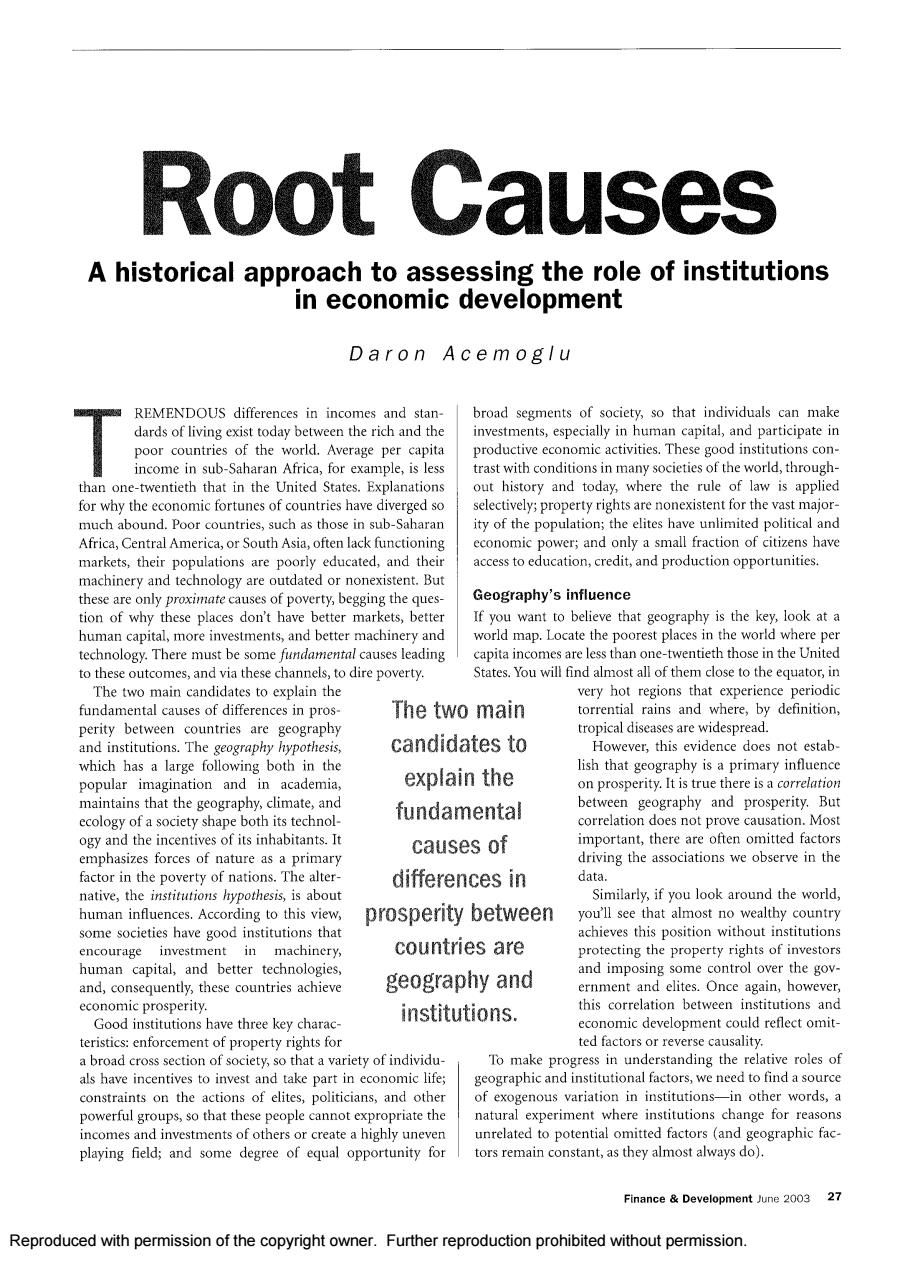正在加载图片...

Root causes A historical approach to assessing the role of institutions in economic development D ar o n A c e m o g l u REMENDOUS differences in incomes and stan- broad segments of society,so that individuals can make dards of living exist today between the rich and the investments,especially in human capital,and participate in poor countries of the world.Average per capita productive economic activities.These good institutions con- income in sub-Saharan Africa,for example,is less trast with conditions in many societies of the world,through- than one-twentieth that in the United States.Explanations out history and today,where the rule of law is applied for why the economic fortunes of countries have diverged so selectively;property rights are nonexistent for the vast major- much abound.Poor countries,such as those in sub-Saharan ity of the population;the elites have unlimited political and Africa,Central America,or South Asia,often lack functioning economic power;and only a small fraction of citizens have markets,their populations are poorly educated,and their access to education,credit,and production opportunities. machinery and technology are outdated or nonexistent.But these are only proximate causes of poverty,begging the ques- Geography's influence tion of why these places don't have better markets,better If you want to believe that geography is the key,look at a human capital,more investments,and better machinery and world map.Locate the poorest places in the world where per technology.There must be some furdamental causes leading capita incomes are less than one-twentieth those in the United to these outcomes,and via these channels,to dire poverty. States.You will find almost all of them close to the equator,in The two main candidates to explain the very hot regions that experience periodic fundamental causes of differences in pros- The two main torrential rains and where,by definition, perity between countries are geography tropical diseases are widespread. and institutions.The geography hypothesis, candidates to However,this evidence does not estab- which has a large following both in the lish that geography is a primary influence popular imagination and in academia, explain the on prosperity.It is true there is a correlation maintains that the geography,climate,and between geography and prosperity.But ecology of a society shape both its technol- fundamental correlation does not prove causation.Most ogy and the incentives of its inhabitants.It causes of important,there are often omitted factors emphasizes forces of nature as a primary driving the associations we observe in the factor in the poverty of nations.The alter- differences in data. native,the institutions hypothesis,is about Similarly,if you look around the world, human influences.According to this view, prosperity between you'll see that almost no wealthy country some societies have good institutions that achieves this position without institutions encourage investment in machinery, countries are protecting the property rights of investors human capital,and better technologies, and imposing some control over the gov- and,consequently,these countries achieve geography and ernment and elites.Once again,however, economic prosperity. institutions this correlation between institutions and Good institutions have three key charac- economic development could reflect omit- teristics:enforcement of property rights for ted factors or reverse causality. a broad cross section of society,so that a variety of individu- To make progress in understanding the relative roles of als have incentives to invest and take part in economic life; geographic and institutional factors,we need to find a source constraints on the actions of elites,politicians,and other of exogenous variation in institutions-in other words,a powerful groups,so that these people cannot expropriate the natural experiment where institutions change for reasons incomes and investments of others or create a highly uneven unrelated to potential omitted factors(and geographic fac- playing field;and some degree of equal opportunity for tors remain constant,as they almost always do). Finance Development June 2003 27 Reproduced with permission of the copyright owner.Further reproduction prohibited without permission.Reproduced with permission of the copyright owner. Further reproduction prohibited without permission